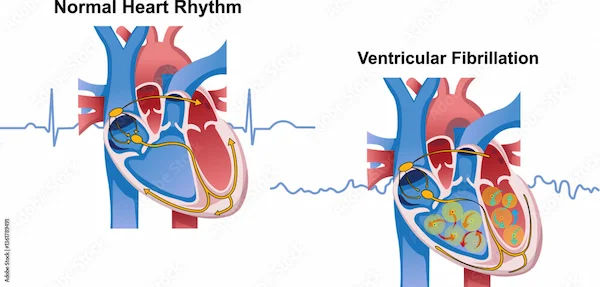Coronary Heart Disease-Symptoms, Factors, and More
Discover key insights into coronary heart disease, including its symptoms, risk factors, and effective treatment options. Learn how lifestyle changes and medical interventions can help manage and prevent this common heart condition.

Written by
Last updated on 3rd Jul, 2025
Coronary heart disease, otherwise known as CHD, is one of the most dangerous health disorders affecting millions of individuals across the world. It involves narrowing or blockage in the coronary arteries supplying blood to the heart. The lack of enough blood flow may lead to chest pain, short breath, or even a heart attack. This is why learning about the disease is crucial for preventing the disease from arising in people and, consequently, controlling its impact on their health.
Taking good care of one's heart ensures not only a longer life but also a better quality of life. Diseases affecting the heart will not affect the patient alone; they'll have effects on their families and even healthcare systems. A step taken towards eradicating CHD by increasing public awareness of the cause will enable the overall improvement in health results.
Causes of Coronary Heart Disease
The most common cause of CHD is a condition called atherosclerosis. It occurs when the coronary arteries develop deposits, known as plaque, that eventually build up on their inner walls. This buildup takes some time and becomes harder with time, causing the narrowing of the arteries, thereby restricting blood supply to the heart. In turn, the reduced blood supply implies the heart doesn't receive adequate oxygen and nutrients for its proper functioning, hence risking complications such as heart attacks.
There are well-established risk factors for CHD causation and they are:
Lifestyle factors make a significant contribution to the development of CHD. For instance, smoking, unhealthy dieting and a lack of exercise can all contribute.
High cholesterol, high blood pressure, and diabetes increase the risk.
A family history of CHD increases the genetic risk of developing the condition.
Frequently, it is a combination of all of these factors that actually causes coronary heart disease.
Symptoms of Coronary Heart Disease
The symptoms of CHD vary and may not present until the disease has reached an advanced stage. Thus, recognising early signs is crucial in making timely visits to the doctor. Common symptoms include:
Chest discomfort, usually described as a tight or heavy feeling, especially during physical activity
Fatigue, dizziness, or shortness of breath during exertion.
As the disease progresses, symptoms can worsen and may require urgent medical attention. Symptoms may include acute chest pain that does not resolve, radiating to the arms, jaw, or neck, and shortness of breath with minimal exertion. They should be treated as emergencies; thus, early diagnosis and treatment of an individual with coronary heart disease improves the prognosis
Consult Top Doctors For Coronary Heart Disease
Diagnosis of Coronary Heart Disease
Diagnosing coronary heart disease involves a combination of assessing symptoms, reviewing medical history, and conducting specific tests to determine the extent of the condition. Early and accurate diagnosis is key to managing CHD effectively and preventing serious complications like heart attacks.
Physicians begin by inquiring about symptoms, lifestyle, and family history of heart disease. A physical examination would help identify signs such as high blood pressure, irregular heartbeats, or any other related issues.
Some of the key diagnostic tools include:
ECG: This records the electrical activity of the heart to determine irregular rhythms or past heart damage.
Stress Test: This tests how well the heart works when it is under strain.
Echocardiogram: Uses sound waves to create images of the heart and is done to look for structural defects or defective blood flow regions.
Cardiac Catheterisation: This procedure includes passing a very thin tube in the arteries in order to observe any blockage or reduced flow.
CT Coronary Angiography: Provides detailed images of the coronary arteries to look for plaque build-up and narrowing.
Each test provides valuable information to help healthcare professionals diagnose CHD and tailor treatment for the patient.
Prevention of Coronary Heart Disease
A healthy heart begins with an early control of risk factors. Small lifestyle changes become more significant in preventing CHD.
1.Healthy Eating
Choose a diet rich in fruits, vegetables, whole grains, and lean proteins.
Limit saturated fats, trans fats, salt, and sugar to maintain healthy cholesterol and blood pressure levels.
2.Regular Physical Activity
Engage in at least 150 minutes of moderate exercise, like brisk walking or cycling, each week.
Include activities that strengthen muscles and improve flexibility.
3.Avoid Smoking
Smoking damages blood vessels and promotes plaque buildup. Quitting is one of the most effective ways to lower CHD risk.
4.Manage Stress
Practise relaxation techniques like meditation, yoga, or deep breathing.
Ensure adequate sleep and seek support for mental health challenges.
5.Monitor Health Regularly
Keep track of blood pressure, cholesterol levels, and blood sugar through routine check-ups.
Address any abnormalities early with medical advice.
Following these preventive steps can significantly improve heart health and reduce the risk of CHD. Prevention not only benefits individuals but also eases the burden on healthcare systems.
Living with Coronary Heart Disease
Managing coronary heart disease is a lifelong journey, but with the right strategies, individuals can lead fulfilling and active lives. It requires a combination of medical care, lifestyle adjustments, and emotional well-being to keep the condition under control and maintain a good quality of life.
Regular check-ups are essential to track progress and detect any changes early. Monitoring blood pressure, cholesterol levels, and overall cardiac function helps prevent complications. Wearable devices, such as smartwatches, can also assist in keeping track of heart rate and activity levels. Staying in close communication with healthcare providers ensures timely adjustments to treatment plans.
Further, living with a chronic condition like CHD can be emotionally taxing. Anxiety, depression, or frustration are common but should not be ignored. Support groups, counselling, and open conversations with loved ones can make a significant difference. Practising stress-relief techniques like meditation or engaging in hobbies can also help maintain emotional balance. Taking care of mental health is just as important as physical well-being in managing coronary heart disease.
Complications of Untreated Coronary Heart Disease
When coronary heart disease is left untreated, it can lead to serious and life-threatening complications. Blocked arteries can severely restrict blood flow to the heart, resulting in a heart attack. Over time, repeated strain on the heart may lead to heart failure, a condition where the heart can no longer pump blood effectively. These complications can drastically impact health and quality of life.
CHD also increases the risk of irregular heartbeats, known as arrhythmias. In severe cases, this can lead to sudden cardiac arrest, where the heart unexpectedly stops beating. Without immediate medical attention, this condition can be fatal. Recognising symptoms like palpitations or fainting early can be life-saving.
Conclusion
Coronary heart disease is a significant health concern, but it is manageable with the right approach. By understanding the causes, recognising the symptoms, and embracing prevention strategies, individuals can take control of their heart health and reduce the risk of complications.
CHD develops when the coronary arteries become narrowed or blocked, often due to atherosclerosis. Hence, lifestyle changes, medical treatments, and early diagnosis are crucial for managing the condition. Regular monitoring, dietary adjustments, and physical activity can positively lead you towards a healthier lifestyle. However, evolving technology today is also to be credited!
Advances in medical technology, such as wearable heart monitors and personalised treatment plans, are making it easier to manage CHD. Research into regenerative medicine and improved surgical techniques offers hope for better outcomes. Moreover, global awareness campaigns and educational efforts are empowering individuals to take proactive steps toward preventing and managing heart disease.
Consult Top Cardiologist
Consult Top Doctors For Coronary Heart Disease

Dr. S B Bhattacharyya
Cardiologist
22 Years • MBBS, MD(General Medicine),DM (Cardiology)
Kolkata
Gariaheart Clinic, Kolkata
Dr. Jayarajah Mariappan
Cardiologist
45 Years • MBBS, MD(GEN MEDICINE), DM(CARDIOLOGY)
Chennai
Sooriya Hospital, Chennai

Dr. Amit. A. Bharadiya
Cardiologist
12 Years • MBBS, MD General Medicine, DNB Cardiology, FSCAI
Maharashtra
Surabhi Hospital, Maharashtra, Maharashtra

Dr. Sumanta Chatterjee
Cardiologist
12 Years • MBBS,MD General Medicine,DM Cardiology
Kolkata
HealthYou Speciality Clinic & Diagnostics., Kolkata
(25+ Patients)

Dr. Mangesh Danej
Cardiologist
8 Years • MBBS, MD (General Medicine), DNB (Cardiology)
Pune
Dr Danej clinic, Pune
(375+ Patients)
Consult Top Cardiologist

Dr. S B Bhattacharyya
Cardiologist
22 Years • MBBS, MD(General Medicine),DM (Cardiology)
Kolkata
Gariaheart Clinic, Kolkata
Dr. Jayarajah Mariappan
Cardiologist
45 Years • MBBS, MD(GEN MEDICINE), DM(CARDIOLOGY)
Chennai
Sooriya Hospital, Chennai

Dr. Amit. A. Bharadiya
Cardiologist
12 Years • MBBS, MD General Medicine, DNB Cardiology, FSCAI
Maharashtra
Surabhi Hospital, Maharashtra, Maharashtra

Dr. Sumanta Chatterjee
Cardiologist
12 Years • MBBS,MD General Medicine,DM Cardiology
Kolkata
HealthYou Speciality Clinic & Diagnostics., Kolkata
(25+ Patients)

Dr. Mangesh Danej
Cardiologist
8 Years • MBBS, MD (General Medicine), DNB (Cardiology)
Pune
Dr Danej clinic, Pune
(375+ Patients)


